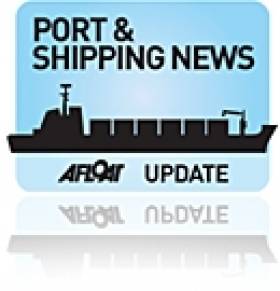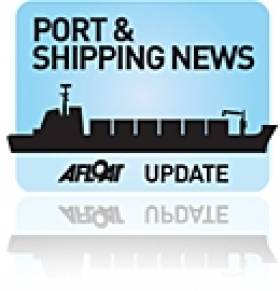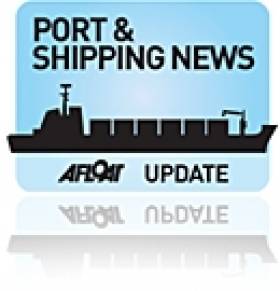Displaying items by tag: P&S Review
Shipping Review: Maiden Call, Boxship Returns, Runcorn Records, ESPO On T-TEN & More
#Ports&ShippingReview - Over the last fortnight, Jehan Ashmore has reported on the shipping scene, where Arklow Beacon, the fourth of six Arklow Shipping newbuilds made her maiden call to Dublin Port.
Atlantic Companion, the massive containership bound for Canada that lost engine power in Irish waters that led to repairs in Bantry Bay, instead returned to Liverpool, her last port of call.
On a related note, next month's Merseyside Maritime Awards "overwhelmed" with the number of entries.
Downriver and leading off is the Manchester Ship Canal where the port of Runcorn Docks smashed monthly cargo records and doubled freight over past 12 months.
Another 'Arklow' cargoship, Arklow Viking called to Runcorn last November and last week she docked in a Portugal, for more click 'CargoShipFocus'.
A European Sea Ports Organisation (ESPO) seminar included core topics to include the new TEN-T Guidelines on transport infrastructure to be funded by the EU.
Ports & Shipping Review: UK Detain Cattleship, New Oil Tanker, Banana Boats a Year On, Ferry Profits and Purchase
#ShippingReview - Over the last fortnight Jehan Ashmore has reported from the shipping scene where Express I, the first Ireland-Libyan serving livestock-carrier for nearly two decades was detained by the UK's Maritime Coastguard Agency (MCA), leading to calls by the Irish Department of Agriculture to revoke the licence of the 7,089 tonnes vessel.
A newbuild oil products tanker, King Fisher docked in Dublin Port, the 7,072dwt double-hulled vessel is operated by James Fisher Everard of Barrow-In-Furness, Cumbria. The vessel was built by Damen Shipyards in Galati, Romania which also completed Commissioners of Irish Lights ILV Granuaile.
The excellent high adrenaline Oscar nominated film 'Captain Phillips' about the pirated containership Maersk Alabama (1998/14,120grt), saw a fleetmate of the US flagged vessel dock in the Port of Cork a year after the 'Banana Boat' trade returned to the harbour.
Higher revenues and operating profits for Irish Continental Group (ICG) last year see container operation EUCON and Irish Ferries take a positive outlook for 2014 with passengers numbers and freight volumes.
Rivals Stena Line surprise acquisition of Celtic Link Ferries Rosslare-Cherbourg service is set to increase the heat on the continental market. Final details are being concluded around the deal which Stena Line hopes to be in a position to take over the running of the thrice-weekly operated route with effect from Monday 31 March.
#ShippingReview: Over the last fortnight Jehan Ashmore has reported from the shipping scene where Fastnet Shipping has added a new 22m windfarm and survey support vessel (WFSV) to its fleet.
According to the 10th edition of the annual Irish Maritime Transport Economist, the volume of cargo shipped though ports saw a small overall increase last year with two of the five principle cargo segments experiencing growth.
At the Dublin Port Company's AGM, it was announced that the port will pay a €7m dividend to the State in June 2013.
Deliveries of hay to Galway Harbour were under the consideration of Minister for Agriculture Simon Coveney in a bid to address the fodder crisis.
Minister of State at the Department of Foreign Affairs and Trade, Joe Costello visited Tanzania to assess the impact of the UNCTAD Port Training Programme.
More news of wind-farm support vessels, as two such craft have returned to Island Shipping, following completion last month of a charter to a UK offshore wind-farm.































































